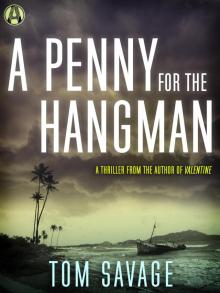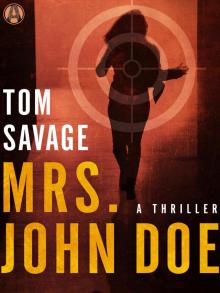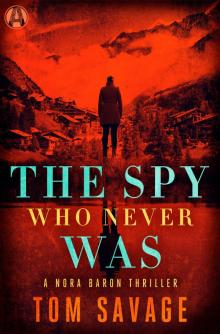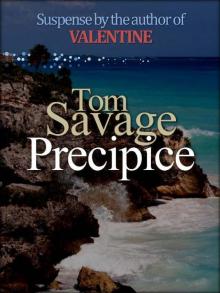- Home
- Tom Savage
Precipice Page 6
Precipice Read online
Page 6
Trish was not a member of Adam and Kay’s yacht club. It was a bit too—well, clubby: Hail-fellow-well-met, eight bells and all’s well, the sun over the yardarm. Drunks, most of them. But Brenda Harriman was a member, and she had repeated to Trish some gossip she’d picked up there. Adam had been seen, more than once, setting sail with his mate, Greg, and some girl. A redhead, of all things. Of course, she was probably Greg’s girlfriend. . . .
She shook her head absently, knowing better than to listen to that nonsense. One of the favorite pastimes of the idle rich on St. Thomas. Besides, it had been months ago. The girl had not been spotted lately, and Greg had apparently left St. Thomas recently. Adam had a new mate now, somebody named Kyle.
I wouldn’t be thinking these things, she told herself, if I liked Adam Prescott. If I didn’t feel there was something—what?—creepy about him. He doesn’t seem to have any friends. . . .
Her mother had never told her about certain types of men—actors and bullfighters sprang to mind—but she had warned her about the two syndromes to be avoided at all costs: Men With Too Many Male Friends and Men With No Male Friends. Too many meant they wouldn’t be around much, and they regarded women in general as Only Good For One Thing. But no male friends was real trouble. If the other boys didn’t trust them, there was usually a very good reason. Cherechez beaucoups des femmes. ..
Kay doesn’t know these things, she thought as her friend emerged from the dressing room wearing the evening dress. Kay is not worldly-wise. . . .
The sky over Glen Cove, Long Island, had been overcast all morning. There had been several flashes of lightning, and a low rumble of thunder in the distance. When the first large, heavy globules of rain hit the flagstone patio, Margaret Barclay closed the novel she’d been reading and slowly, painfully rose to her feet. Leaning heavily on her cane, she went into the house.
She’d known, from the moist feel of the air in her bedroom when she arose, that it was going to be a restless day. A cane day. Sure enough, the first twinge had shot through her right calf even as she made her way downstairs. She hadn’t bothered with breakfast, preferring instead to go straight out back to see to the weeding around her rose bushes. She hadn’t got very far in this endeavor: the dark clouds above her began to announce their presence the moment she knelt and reached for the spade with a rubber-gloved hand. The moist air always aggravated her condition, making her act of kneeling especially painful. So much for that idea. . . .
Oh, well, she’d philosophized, the flowers were looking a little droopy. It had been a particularly dry Long Island summer so far. A good drenching might make everything seem a bit perkier.
Everything but her.
She’d stubbornly refused to go indoors immediately. If she couldn’t do the weeding, she’d at least get some fresh air. A thorough search through the stack of unread books she’d recently purchased had caused further annoyance: she was in no mood for anything. Finally, in desperation, she’d grabbed the paperback romance Mrs. O’Rourke had left lying on the kitchen counter: Enchanted Prairie, by Melissa Mills. She’d always harbored a faint curiosity about this type of literature. She’d hobbled out to the patio with the book and a cup of coffee and settled herself down for however long she’d have before the sky opened.
The novel, like the weather, had immediately made her impatient. When the rain arrived, she rose and entered the house with a vague sense of relief.
The phone in her study was ringing. She made her way to the desk and sank into the padded chair, grateful to remove the pressure from her bad leg. She dropped the book and the cane and reached for the receiver.
“Margaret Barclay,” she announced.
“Hi, Mom.”
The moment she heard the familiar voice, it flashed in Margarets consciousness: the true reason for her foul mood, the anger and frustration she’d been experiencing for the better part of two weeks. She’d actually made it through most of the morning without once worrying about the girl. The sound of her voice immediately corrected that oversight. Forcing a light and, she hoped, natural tone, Margaret went immediately into her Delighted Parent mode.
“Darling! How are you? Where are you?”
“Sorry. I guess it’s been a couple of weeks. I—I’m in Florida. Visiting some friends. How are you?”
Margaret bit back the urge to argue.
“Oh, I’m fine. The leg’s acting up, but it always does when it rains. How’s the weather down there in—Florida?”
Florida! Indeed. . . .
“Perfect. Everything about this place is perfect. Listen, I know I said I’d probably be back in a couple of weeks, but something’s come up. I—I’ve been offered a job down here, and I think I’ll accept it. Just for a while. . . .”
“A job? What sort of job?”
“With a family. Au pair. Taking care of a little girl.”
Margaret raised an imperious eyebrow, but she kept her tone of voice casual. “Do we know this family?”
“Oh, no. Their name is—Goodman. They live in Miami. The girl’s name is Linda. She’s the sweetest thing! Listen, Mom. I don’t have much time. They’re coming to pick me up any minute now. I’ll call you when I’m all settled in, okay?”
She could ask for an address, she knew, or a telephone number. She had a hundred questions burning in her throat, but she knew better than to ask any of them. In some ways, the girl was predictable. But only in some. . . .
“Very well,” she replied, keeping it light. “I look forward to hearing from you. Take care of yourself. And darling, please be careful—whatever you’re doing.”
The girl was not here, thank God, to see the tears in her eyes. She had always been impatient with Margaret’s tears. And now her voice was solicitous.
“Is Mrs. O’Rourke coming in every day?”
“Yes, darling. She feeds me and keeps the house clean. She’s even helping me with the garden. And Bitsy and Louise come over twice a week for Scrabble. Don’t worry about me.”
“I’ll be back soon enough to play Scrabble with you.”
“You always beat me, darling. You and your mania for word games. At least Bitsy and Louise give me a fighting chance.”
“Okay. Take it easy with that leg. Don’t go entering any marathons.”
In spite of herself, the old woman smiled. That girl has her mother’s charm! She can always make me laugh. . . .
“I love you, Mom. ’Bye.”
“Good-bye, darling.”
Slowly, Margaret replaced the receiver.
Her mother’s charm. She glanced at the photograph of the young, beautiful blond woman with the merry blue eyes on the desk before her. Her sister had been gone these twenty years. And now, she reflected, the girl calls me Mom.
Enough: she had to think, and quickly. The girl was up to something. Again. Otherwise, why would she claim to be in Florida? And why the alias? Something must be done, before she gets in more trouble.
Margaret shuddered, thinking of the past. The private day school: thrown out for fighting with the other girls. The boarding schools: flunked. The time she ran away and was found, months later, in that awful house in Haight-Ashbury with the rock-and-roll singer, or whatever he was. The abortion. The methadone clinic. The married men.
The psychologists. The psychiatrists. The priests! Margaret had been desperate. And yet she had never stopped loving the girl, or caring about what happened to her. And she never would. No Barclay had ever walked away from a fight, or deserted one of their own. She would always be there for the girl, she thought as she contemplated the photograph. She owed her little sister that much.
That one doctor, Stein—consulted after the suicide attempt, when she’d been thrown out of Harvard after only two semesters—had made sense of it. He’d told Margaret that the girl was manifesting her rage by means of self-destructive behavior. Losing her parents like that, at such an early age. It had been horrible, the sort of trauma that an adult would have trouble coping with, to say nothing of a six-year-o
ld. He warned that until something made her feel safe and secure, she would probably continue the pattern. He also warned that as she matured, the games would become more complex. More outrageous. And certainly more dangerous.
Safe and secure, She, Margaret, had not been able to provide those feelings. She had not been enough.
A long sigh escaped her lips. She sat, staring at the yellowing photograph of the lovely young woman holding up the beautiful baby girl.
This time, thank God, she had been prepared. She had provided for this eventuality. She didn’t know what her niece had in mind, but she would know soon enough. Soon enough to stop it, whatever it was. Before she hurt herself again.
Or someone else.
Margaret shuddered again and pulled her old, ratty gardening sweater more tightly around her shoulders. What could it be? It almost certainly involved a man. The girl had inherited her mother’s weakness for beautiful men. And Albert, her father, had been beautiful.
A chilling draft, real or imagined, permeated the room. She sat very still, gradually becoming aware of the torment outside that rattled the windows and flooded the garden, replenishing the roses. Nature took care of some things so easily.
But only some, she thought. The rest is up to us.
With grim determination, Margaret reached again for the receiver and slowly dialed a number in St. Thomas, Virgin Islands.
The young woman replaced the receiver in its cradle and made a last, careful inspection of the room. Had she forgotten anything?
The two open suitcases on the bed were full; she would have trouble closing one of them. She smiled. The suitcases had made Mom nervous when she saw them standing in the foyer in Glen Cove twelve days ago. You just got back from that Caribbean jaunt; where are you off to now? She’d preempted Mom’s questions by kissing her lightly on the cheek and dashing off to Kennedy Airport. It was vital that Mom not know where she was.
The plan . . .
She shook her head, thinking back over the catalog of crazy stunts and sorry failures that had been her life. But not this time. This time I will be successful, so successful that nobody—not even Margaret Barclay—will ever forget it.
She loved Margaret, more than anything, but she could not afford to tell her too much. Margaret—Mom—would stop her. And the plan must not be stopped.
The scrapbook, the source of the whole idea, rested on the top of the larger suitcase. She reached down, picked it up, and placed it on the desk of the dressing table. She leafed slowly past the few pages of photographs to the second section. She read and reread the clippings. They were photocopies, of course, recently made: the original scrapbook was safely locked away at home in Glen Cove. All the information was there, all the details of the two surprisingly similar cases. The famous one, twenty years ago, as covered in several New York newspapers. The other was more recent—ten years ago—but information regarding it was much harder to come by. It had occurred in a fairly remote part of Hawaii, on the island of Kauai. The two incidents had provided the necessary modus operandi. Not to mention the inspiration.
The inspiration was perfectly simple: in both cases, the perpetrators had not been caught, had never been brought to justice.
Now, in the present, the same amount of care was being taken. Everything had been worked out, provided for. The dates and times, the travel arrangements, the disguise—and she herself, alone, had come up with the final, Grand Guignol touch.
The means.
They had planned most of it on the Kay two months ago, making sure that Greg was out of earshot. He had to be along on their outings, Adam had explained. Beard. Besides, he’d pointed out, staring into her bright-green eyes and reaching over to caress her bright-red hair, it was Greg who’d introduced them in the first place. . . .
She smiled now, remembering. She’d met Greg in Sparky’s Waterfront Saloon late one night. She’d been there with another young woman from her hotel, a plump, frizzy-haired schoolteacher from Pittsburgh whose name she’d now forgotten. On her third night in St. Thomas they’d been out pub-crawling, or “man-hunting,” as Pittsburgh had tipsily giggled. She had been told to try Sparky’s, and she insisted, over Pittsburgh’s initial protestations, on checking it out. They’d wandered into the friendly, crowded bar and plunked themselves down on barstools, direcdy next to the attractive young man who had immediately begun the usual staring ritual. He’d bought them drinks, and within an hour Pittsburgh had been picked up by the bartender and she had made a date with Greg to go sailing on his boat the following afternoon.
The boat, of course, was not his.
She would never forget the moment she first set eyes on Adam Prescott. Even now, just at the thought of him, a raw electric shock formed in the pit of her stomach and moved slowly up her spine to tingle at the back of her brain. . . .
She placed the scrapbook carefully back in the bag and looked around. Yes, she was ready now. She called the hotel office, and a big, friendly native man arrived to take the luggage and the easel down to the front entrance. She followed him, carrying the paint-box. She checked her watch: she still had thirty minutes to wait. She settled her bill in the office and wandered out to the open-air bar beside the pool.
The bartender was just placing the tall, fruit-embellished pina colada before her when her fellow guest, the ubiquitous Bob, slid into the chair next to her.
“Hi!”
She forced a smile. “Hello.”
“I see you’re not in your Island Period today.”
“What? Oh, no,” she said. “Just taking it easy this afternoon. I’ll paint some more later. What are you up to?”
She wasn’t really interested, of course, just killing time. But he was rather—well, if she hadn’t had the plan . . .
“Nothin’ much.” He grinned and ordered a Heineken. “But my plans have changed. I’m here a while longer, all expenses paid. That includes dinners, by the way. Interested?”
“Sorry. My plans have changed, too. I’m leaving today.”
She didn’t tell him about Cliffhanger. The fewer people who knew her business, the better.
“Back to New York?” Bob asked.
“Eventually.”
“Uh-huh. Well, sköl!”
They chatted pleasantly for a while longer. At last she saw the beige Land Rover pull up in the entrance driveway beyond the office. She stood up.
“Excuse me a moment,” she said.
“Sure.” The young man grinned.
She walked past the office, picked up her bags, and went over to Kay, who was just emerging from the car.
“Hi,” she said.
“Hello, Diana. Ready?”
She nodded. The two women put the luggage and the easel in the back and climbed in. She glanced back over at the bar. Bob was talking to the bartender, and the two of them were laughing. Her departure was going unnoticed. Good.
They traveled along the now-familiar road in the direction of town and turned at the entrance to the driveway. In minutes, they were there.
Kay parked the Land Rover in the shade of the tamarind and turned, smiling, to her new employee.
“Here we are,” she said. “I just know you’re going to love it here. And I know somebody who’s overjoyed by your arrival!”
Yes, she thought, smiling back at Kay Prescott. So do I.
Nola met them at the door.
“Mrs. Prescott, Ms. Manning has called twice in the last twenty minutes. She says to call her the moment you get in.”
“Thank you, Nola. Could you get the rest of Ms. Meissen’s things and put them in her room?”
“Of course. Welcome, Ms. Meissen.”
The young woman smiled and followed Kay into the living room. Kay went over to the phone and dialed.
“Hello, darling,” she said into the receiver. “I just left you seconds ago downtown. What on earth—” She stopped, obviously cut off by Trish’s voice. She listened a moment, her eyes widening in disbelief. “What?! Oh, dear God! When? Oh. It must have
been while you were all playing golf. Jesus! I’ll be right over.”
She hung up and headed for the front door.
“Sorry, Diana. I have to go to the Harrimans’ house. They’ve been robbed, and Brenda is distraught. Maybe Trish and I can help out. When Adam returns from St. John, tell him where I am. I don’t know if I’ll be back in time for dinner, so go ahead without me.”
She ran past Nola, who was just entering with the luggage, jumped back in the Land Rover, and drove away.
The young woman watched Kay disappear and smiled to herself. The Harrimans, whoever they were, had been robbed.
The game was afoot.
She turned around, then, to see Lisa and Jumbi running down the stairs to greet her. The dog stopped short several feet away and refused to advance nearer. Its mistress had no such reservations.
“You’re here at last!” Lisa sang out, bounding right up to her.
The young woman smiled.
“Yes,” she replied. “I’m here. At last.”
She isn’t here, he thought. She’s gone.
He’d been waiting at the bar for nearly an hour. Then he’d gone to her room and knocked. No answer. At last he went down to the office.
“Ms. Meissen?” the startled manager said. “Why, she’s gone. Checked out about an hour ago. . . . No, she didn’t leave a forwarding address. Besides, I wouldn’t be able to tell you—”
He ran out to his rented Chevette and raced across the length of the island to the airport.

 The Devil and the Deep Blue Spy
The Devil and the Deep Blue Spy Scavenger
Scavenger A Penny for the Hangman
A Penny for the Hangman The Woman Who Knew Too Much
The Woman Who Knew Too Much Mrs. John Doe
Mrs. John Doe The Spy Who Never Was
The Spy Who Never Was Precipice
Precipice